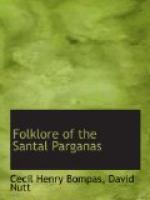But when her husband heard what had happened he was very angry, and scolded her well; she could easily have thrown away the fruit and carried home the children in the basket tinsead of taking so much trouble about the karla fruit, as if no one had ever seen any before. He wanted to take a few friends and go and look for the children at once; but his father and mother begged him not to risk his life in the jungle at night; the woman had been a fool but that could not be remedied; people must learn by experience; as the Hindu proverb says “When your caste goes, wisdom comes.” They could not allow the breadwinner of the family to risk his life; though the roof and doors of the house had gone, the walls remained; as long as the tree stood new branches would grow; but if the tree fell there was no more hope; so in the end the children were left where they were.
No sooner had the mother gone than a pair of king vultures swooped down to make a meal of the children but they cried so pitifully that the vultures had hot the heart to kill them but instead carried them up to their nest and brought them food: and nurtured them. And when the children began to walk they carried them down to the ground and when they were big enough to take care of themselves they told them to go into the neighbouring villages and beg; but they forbade them to go towards the village in which their real parents lived. So every day the two boys went out begging, and as they went from house to house, they sang:—
“Our mother took away
the karla fruit
She covered us up with Asan
leaves.
The pair of King vultures
Reared us.—Give
us alms.”
And people had pity on them and gave them enough to live on. One day the two boys thought that they would go and see what the country was like in the direction which had been forbidden to them; so they set out singing their usual song, and when they came to the house where their mother lived she heard them sing and knew that they must be her children; so she called them and bathed them and oiled their bodies and told them that she was their mother and they were very glad to stay with her.
But when the children did not return, the vultures flew in search of them and circled round and round in the air looking for them. The mother saw them and knew what they wanted, so she took the children into the house and hid them under a large basket. But the vultures flew down to the house and tore a hole in the thatch and entered through it and overturned the basket and seized the children. Then the father and mother also caught hold of them and the vultures pulled and the parents pulled until the children were torn in two and the vultures flew away with the portions they had secured. The father and mother sorrowfully burnt on a pyre the remains of the children that were left to them.
The vultures when they reached their nest were unwilling to eat the flesh of the children they had reared, so they set fire to their nest; but as the flames rose high, some juice spirted out from the burning flesh on to the vultures and they tasted it and found it so good that they pulled the rest of the flesh out of the flames and ate it, and from that time vultures feed on human bodies.




